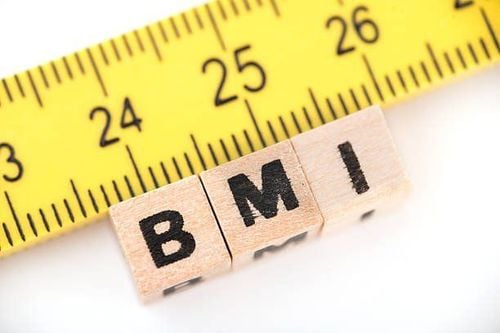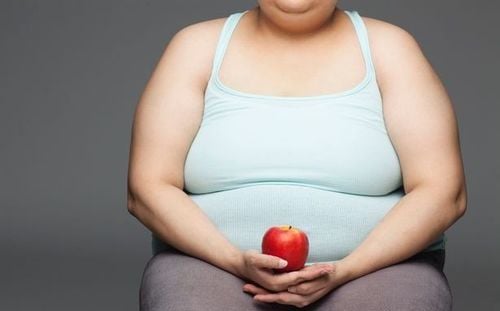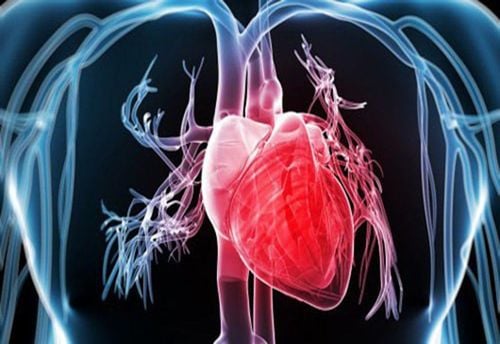This is an automatically translated article.
BMI is the most common index in the world used to determine whether a person is thin or fat. However, the assessment of BMI of the elderly is different from that of the young. Let's learn about the BMI of the elderly and ways to adjust this index to a reasonable and safe level for health.
1. What is BMI?
BMI (short for "Body Mass Index") is body mass index, a weight index that helps assess a person's body as thin or fat through an index. It is recommended that all adults should maintain a BMI between 18-25. If this BMI>25, it is highly likely to be overweight, and over 30 indicates obesity. However, BMI also has a different assessment level depending on the condition and age of each person.

Chỉ số BMI giúp đánh giá khối lượng cơ thể
2. BMI of the elderly and health problems
Normally, the BMI formula is calculated by dividing your weight (kg) by your height (m2). Many studies have been set out to determine the correlation of BMI with the health status of the elderly. For example, there are many factors that cause the BMI of the elderly to be higher than usual such as cardiovascular disease, high blood pressure, diabetes, vascular disease... and vice versa, there are also conditions that make BMI of the elderly is lower than normal.
In general, BMI in the elderly can contribute to identifying some of the following problems:
2.1. Risk of being underweight
Many people think that being overweight is more dangerous for adults over 65, but in fact, research has shown that it is being underweight that increases the risk of death in the elderly.
Underweight will make the body not enough nutrients, the metabolism is affected, the resistance is poor, affecting health and reducing the ability to recover from disease. Elderly people who lose weight after a stroke are also more likely to have severe complications than other patients.
Therefore, in order to maintain the weight of the elderly at a reasonable level, it is advisable to eat enough nutrients and do light physical exercise daily to enhance the body's ability to prevent disease.

Thừa cân ở tuổi 65 mang lại nhiều rủi ro cho sức khỏe
2.2. Health challenges and risks
On the contrary, in some elderly people who are overweight, some chronic diseases such as heart disease, diabetes, high blood pressure, osteoarthritis, gout and respiratory disorders such as sleep apnea ... tends to progress more seriously, directly affecting daily life.
For example:
Obese people have an increased risk of osteoarthritis, a high rate of osteoporosis causes body pain. Dyslipidemia, blood lipids or high cholesterol create conditions that cause fibrosis of the blood vessels, increased blood pressure, and increased risk of stroke and myocardial infarction. Obesity easily causes the intestinal loop to be attached to an excess of fat, causing constipation or hemorrhoids. Stagnant stools increase the risk of gastrointestinal diseases, including colon cancer. Obese people are often prone to fatty liver, which, if not handled in time, can lead to cirrhosis.
3. The role of balancing the BMI of the elderly
It is a fact that the older you get, the more and more your metabolism declines, causing many health problems to arise, making it increasingly difficult to adjust the BMI of the elderly back to the balance level. towel.
If it is possible to maintain the weight of the elderly at a reasonable and stable level, it will greatly reduce the risks to health, and also help them be more active, psychologically comfortable, and love life more.
In addition, there are also many studies that have proven that diet, activity and exercise can make a significant change in health for the elderly. This is also the most reasonable and safest way to balance the BMI of the elderly.

Chế độ ăn uống ảnh hưởng đến chỉ số BMI của người già
4. Measures to balance BMI of the elderly
According to the US National Institutes of Health, the elderly BMI should maintain between 25-27 is best. However, the ideal BMI is not the same for everyone and needs to be flexibly adjusted depending on the patient's health and physical condition. Example:
For elderly people with diabetes, dietary changes may be suggested. For the elderly with anemia, the patient will be prescribed nutritional supplements. Some suggestions to help balance BMI of the elderly:
Diet focuses on quality over quantity: Provides less energy but higher nutritional content, especially protein, B vitamins and calcium . Regularly calculate your calorie intake: At the same time, pay attention to detect abnormal weight loss (if any) and be ready to take corrective measures before the condition becomes serious. Elderly people should not force themselves to follow strict diets or lose weight actively. Instead, you should aim to eat healthy and suitable for your body condition. Consider talking directly with your doctor or dietitian for guidance on your weight goals and the types of vitamins and minerals to supplement (if needed). Overall, it's never too late to enjoy the benefits of a balanced diet and exercise routine. This will help the elderly's BMI gradually become more stable and change health, energy and mood for the better. If you suspect that you have signs of overweight or obesity, the elderly need to have a medical examination at a reputable medical facility to determine the status and take timely measures to treat and prevent complications.

Dựa vào chỉ số BMI, bác sĩ sẽ đưa ra những biện pháp cải thiện cho sức khỏe cho người bệnh.
Currently, Vinmec International General Hospital is one of the leading prestigious hospitals in the country, trusted by a large number of patients for medical examination and treatment. Not only the physical system, modern equipment: 6 ultrasound rooms, 4 DR X-ray rooms (1 full-axis machine, 1 light machine, 1 general machine and 1 mammography machine) , 2 DR portable X-ray machines, 2 multi-row CT scanner rooms (1 128 rows and 1 16 arrays), 2 Magnetic resonance imaging rooms (1 3 Tesla and 1 1.5 Tesla), 1 room for 2 levels of interventional angiography and 1 room to measure bone mineral density.... Vinmec is also the place to gather a team of experienced doctors and nurses who will greatly assist in diagnosis and detection. early signs of abnormality in the patient's body. In particular, with a space designed according to 5-star hotel standards, Vinmec ensures to bring the patient the most comfort, friendliness and peace of mind.
Please dial HOTLINE for more information or register for an appointment HERE. Download MyVinmec app to make appointments faster and to manage your bookings easily.













